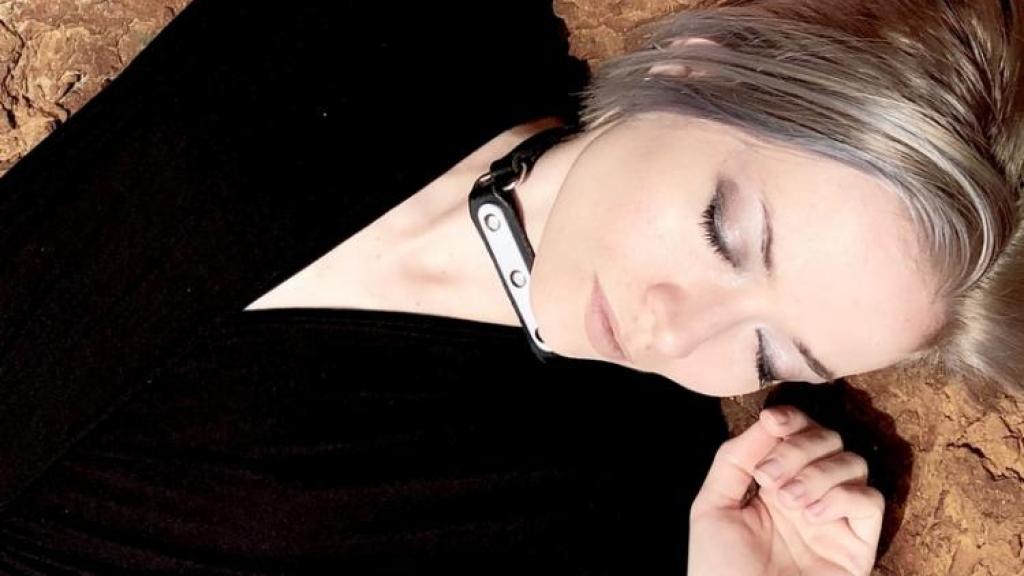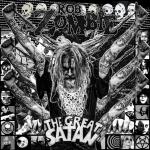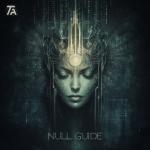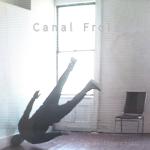Christmas miracles do happen! Some months ago, we interviewed Alison Lewis, the free spirit of the electro scene behind the solo project ZANIAS. Due to unexpected events totally dependent of our will, we were not able to publish this interview until now. So let's catch up and discover or rediscover the phenomenon ZANIAS.
You have lived in various countries during your childhood. In which one were you living when you discovered dark music?
Alison Lewis: I guess I will give you a timeline. My family was living in Papua New Guinea. My mom flew to Australia because it makes it easier to be born in Australia and 3 weeks after my birth, she flew back to Papua New Guinea, where I spent my first six months. Then the civil war started and we had to evacuate. I spent five years in Indonesia, one year in Australia, ten years in Malaysia and then I spent two years in Australia before I went to London for university. My discovery over music happened when I lived in Malaysia, on the internet. I was really lonely there, I didn’t have many friends that I really liked, I think they were only… two. But two good ones! Everyone else, sorry guys, I hated you all! (laugh) But my friends weren't even into the same style of music. So I went on the internet and discovered THE CURE, SIOUXSIE AND THE BANSHEES and it spoke to my teenage angst in a way that nothing else did. So I dug deeper and deeper and I got into death rock, especially CHRISTIAN DEATH. This band is really important to me. Then, when I moved to Australia, I was very excited to finally be able to go out at parties that play that music. But I was a little disappointed that there weren’t many people making it. Which is why, when the opportunity to go to university in London came up, I didn't hesitate.
So music was also a reason for you to move there.
A.L: Definitely! I was studying archeology. I didn’t think I would be a musician or anything, but I really wanted to be around the music I loved.
But was making music still a hypothetical plan you had in mind at that time?
A.L: It used to be when I was younger, but I then completely left this dream behind because I didn’t believe it was possible. I didn’t think I had any talent. I didn’t know I could sing. I used to sing alone in my room.
Have you ever learnt music?
A.L: Rudimentary. I have learnt theory in high school and I played the clarinet.
When did it become obvious for you that you would run a musician career?
A.L: In my final year of university, when I met Ryan (Ambridge, editor's note) from LINEA ASPERA. We started writing music together. It was the best thing I’ve ever done in my whole life. I had never felt so good as I did when I was on stage. Then, when I started my Master in Human evolution, I just felt I couldn’t focus on it because I just wanted to make more music and I wanted to be available to play more gigs. So I thought I needed to take this chance now and make it happen.
Did you finally graduate?
A.L: I have a Bachelor in Science and Archeology, but I don’t have the Master. I quit before I finished.
How did your parents react?
A.L: Well, archeology already is one of the worst industries for getting a job. So I had to choose between making no money digging holes in the ground and making no money being a musician. And my parents – especially now that things are going a bit better – are actually extremely proud of me. I’m extremely supported. They’re the reason why I’ve been able to do this, because they were the ones who paid my rent when I couldn’t, back when I wasn’t making really much money. They always knew that I was serious about what I was doing, and the reason I wasn’t making money immediately was because music is difficult. So they were patient. They gave me their full support.
LINEA ASPERA was your first project ever. Ryan composed and you wrote and sang?
A.L: Yes, he did all the production on LINEA ASPERA. I sometimes would play a few synths but I really didn’t know anything at that point. I didn’t even know what reverb was on my voice. I had no idea. I would turn up to soundcheck with my microphone and just kind of wing it.
Now you’re alone on stage. How did you achieve that?
A.L: After LINEA ASPERA ended, I started KELUAR with Sid (Lamar, editor's note). He taught me a lot. Then, when KELUAR was starting to look like it wasn’t going to last, I realized I had to learn how to do things myself and I wanted to because I wanted to be expressive. So I went to a music production school, DBS, in Berlin, for 6 months. I quit right before there was a group project because I didn’t want to work with any of my classmates (laugh) because they made terrible music – sorry guys! And I’ve been trying to learn as much as I can ever since, a lot of it independently. I’ve learned from my friends, I’ve asked them for tips. In Berlin I’m surrounded by incredibly talented people so if I have questions, I would have someone I can ask. I’m still learning now.
You aroused my curiosity when you said “when I realized that KELUAR wouldn’t last”. You were with both of your bands on the verge of becoming really successful before both projects disappeared. What happened?
A.L: With LINEA ASPERA, it was never my choice to quit. Ryan decided that he didn’t want to do it anymore. We weren’t a couple in private life, there was nothing to do with that. He just decided he didn’t want to make that sort of music. I still wanted to. I wanted to keep going. And that still hurts me today. Every time someone says “LINEA ASPERA was the best thing you’ve ever done”, my heart breaks a little, every time.
Then I won’t say it.
A.L: Everyone says it, it’s fine. ANCIENT METHODS said that to me last night. I love ANCIENT METHODS (embarrassed). That broke my heart. At the time LINEA ASPERA stopped, I was in a relationship with Sid Lamar. He suggested we start a project together. So we did KELUAR but it never quite felt like LINEA ASPERA did. It felt a little bit forced the whole time. I still loved it, but it wasn’t so “me”. When Sid and I broke up, I couldn’t be in a band with him anymore, it was too difficult.
But you’re still involved with him through your label.
A.L: Yes, I release SCHWEFELGELB on Fleisch.
It seems like you’re looking for yourself through your frequent house moves and changes of bands. I wonder if you finally found yourself now with ZANIAS?
A.L: Yes, totally! It’s obvious that I just didn’t need a man to be propping me up. I want to do a project where I’m the one in control, where I’m not just doing what someone else tells me to. I’m very sick of that thought that I’m just a vocalist. I was treated like that for a long time and now I want to do the whole thing. I still work with a man, Alex, who is my friend and my mentor but we have a very different working relationship from all I’ve ever known before. He’s really aiming to fulfill my vision and not the other way around. He really feels like a musical soulmate in lots of ways, even though he lives on the other side of the world.
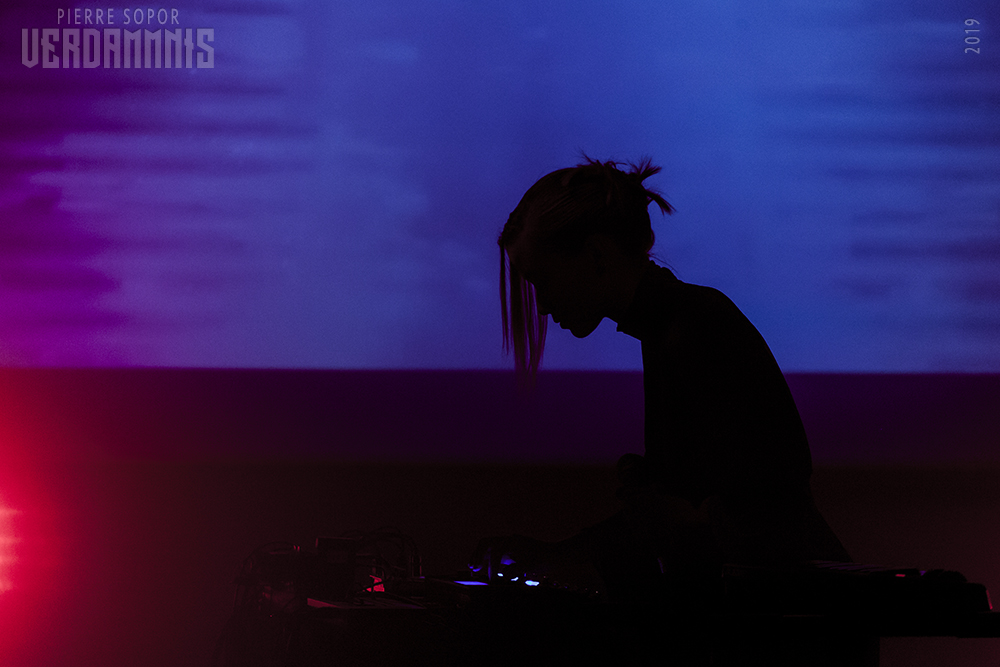
But it doesn’t mean I didn’t know who I was before. LINEA ASPERA and KELUAR were exactly what I wanted to make at that time. I always just make the music I wish I could hear, that’s why I think it’s quite hard for people to categorize me. I have never intended to fit in a specific genre and I do not believe any of us really has a ‘true self’ as we are constantly evolving. ZANIAS is me now but this project’s sound too will change. I will never ever put out the same record twice.
There is a paradox between your themes and lyrics, very anchored in the ground, concrete, mundane (like the description of the anatomy, flesh, bacteria) and your music itself, becoming more and more ethereal, almost mystical. Do you play with this paradox on purpose?
A.L: Yes, but I think it’s part of being human. We are these conscious fleshbags. It’s strange, isn’t it? In our imagination, we can go anywhere we want but at the end of the day, we’re just these wandering mounds of meat. It’s weird (laugh).
Hairy meat bags we are! (general laugh)
A.L: But that’s partly why ZANIAS and Fleisch are separate and yet connected entities. ZANIAS music doesn’t sound like it’s made for the dancefloor, but for introspection and reflection, the moments you spend with your mind. While Fleisch is the moment you spend with your body and it’s important to spend time with both of them and to not forget one to the other.
You have ZANIAS, you have your work at your label, you’re also DJing all around the world… that’s a lot!
A.L: I love DJing so much. That’s one of my favorite things to do right now, because the connection and feedback of the audience are immediate and you’re not restricted by your own discography. You can use anyone’s music and you can mix it in any way you like. It feels like we’re connecting to a very ancient and human ritual, this whole moving together as a group. The energy from that is very intoxicating and I’m a bit addicted to it. It’s different from playing a live gig.
In a live gig, there’s more space between you and the audience because you are performing and your audience isn't necessarily dancing, sometimes they’re just watching and that’s actually a very vulnerable position to be, as a performer, to be watched by so many people. As a DJ, you can hide a little, you’re not under pressure to perform. You just have to keep the beat going, keep the energy going, without having to necessarily increase the bpm. I think it’s what really makes a good DJ.
It’s your first album under the name of ZANIAS and it sounds very organic, very personal, plunged into your exotic roots. Was it intentional to go so far into yourself?
A.L: Definitely. I wanted to show the breadth of my life experience and I really meant to showcase these sounds from all the places I’ve been, all the places I love. I love the sounds of various instruments and manipulating samples. That's how DEAD CAN DANCE make their music too. I’m so inspired by DEAD CAN DANCE. Into the all is much an album about me as it is about them. Lisa Gerrard goes beyond language. I wish more singers would do that and not restrict themselves to their lyrics because, one thing that also inspired me was learning how many people around the world love LINEA ASPERA without knowing the lyrics. I put all these efforts into writing those lyrics and people can still love the music without even knowing what they are. Sometimes it can be even more powerful if there are no lyrics and it’s just raw emotion. And that’s also in itself a very weird thing when you think about it because it’s just a frequency, that you admit can then communicate with another human being how you’re feeling without using any of our words. So I’ll definitely explore more of that in the future. I still love writing lyrics, I won’t stop doing that, but I really like this idea of using a voice as an instrument.

